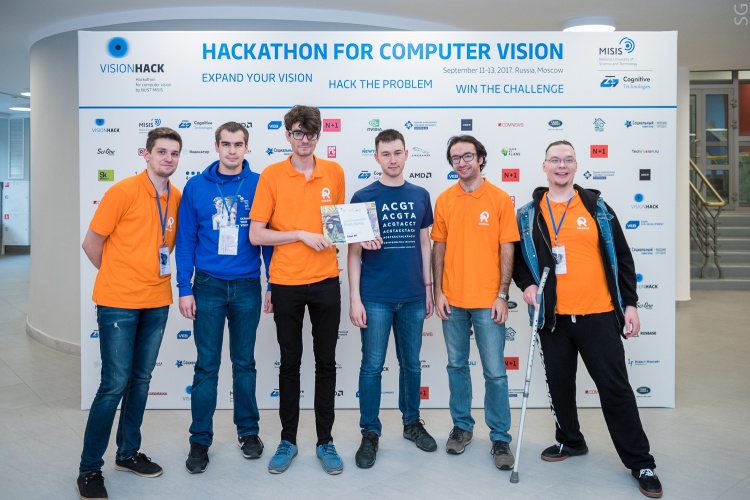The official launch ceremony was held in the framework of the Russian conference "Digital Industry of Industrial Russia". The competence centre will help Innopolis to become a new hub of Russian robotics.
The opening ceremony was attended by the Deputy Prime Minister of the Republic of Tatarstan, Minister of Informatization and Communications, Roman Shaikhutdinov, Director of Innopolis University, Kirill Semenikhin, Rector of Innopolis University, Aleksander Tormasov, Director of the "Young Professionals" program of the Agency of Strategic Initiatives, Dmitry Peskov, and Director General of the Russian Venture Company, Alexander Povalko.
Roman Shaykhutdinov: "Thanks to the opening of the center the young University will receive support on the national level via the Russian Venture Company. The company deals with important projects under the National Technology Initiative. I congratulate the team of Innopolis University on this achievement. Indeed, it is a big step and a great responsibility to be a competence centre in the field of robotics ".
During the event, experts of the IT University told about the current projects of the Centre of Robotics Development and its partners, in particular, the Ministry of Education and Science of the Russian Federation, "KAMAZ", "Androidnya Tekhnika", Polytech, Innovation Promotion Fund, "Arkodim", Russian Research Foundation, Russian Venture Company, Skolkovo, Agency of Strategic Initiatives, "Sberbank", ITMO.
In May 2018, the Russian IT University was announced the winner in the grant competition for creation and development of a competence center for end-to-end technology titled "Components of Robotics and Mechatronics". The consortium of the centre under the supervision of Innopolis University includes 16 leading universities of Russia, 5 academic institutions of applied research , 7 foreign partners from France, China, Denmark, Sweden, Germany and Norway, and 16 industrial partners, including Moscow Institute of Physics and Technology, ITMO University, Higher School of Economics, Far Eastern Federal University, Institute for Information Transmission Problems and Institute of Machines Science of the Russian Academy of Sciences, "Sberbank", "Gazprom", "Aeroflot", IMT Atlantique (France) and Shenzhen Institutes of Advanced Technology (China).
Alexander Povalko: "It was a tough competition. We had to organize selection twice to find the best candidate. Application submitted by Innopolis University was made professionally. It demonstrated a huge potential of the consortium participants and deep understanding of the mission of the center. We are sure that representatives of the University are responsible people who will not make unsubstantiated statements. We will pay close attention to the operation of the centre. This is an meaningful and a unique occasion when so many organizations having completely different scopes of interest agree on a voluntary collaboration. For the members of the consortium it is important to establish effective relationship. We hope that the enthusiasm demonstrated in the beginning of the contest will be preserved during the 4 years".The centre will focus on the development of industrial and collaborative robotics, creation of new robotic solutions for healthcare and rehabilitation, agriculture, design of anthropomorphic and multilegged walking robots, unmanned aerial and ground vehicles. In May 2018, the competence centre of Innopolis University will start new projects, in particular: Innovative models of electric vehicles with partial autonomy modules and intelligent driver assistance systems; autonomous modular hybrid vehicles with land-and-air travel modes; robotic solutions for construction of buildings and infrastructure; high-tech prostheses for rehabilitation of upper and lower extremities; tactile sensing technology in medicine, industry and for human-robot interaction, etc.
Dmitry Peskov: "This center has a huge agenda. Today we gathered at a unique place and time. We are at the University built from scratch, growing by leaps and bounds and shooting ahead its competitors. Building the new centre we also understand the importance of holding the top spot. We will provide support and guidance to partners so that they could become part of the consortium. And then, I hope our country will move from the last to the middle position (at least) according to the number of robots in relation to population."
National competence center will open 4 new laboratories: "Industrial robotics" (May 2018), "Autonomous Vehicles" (September 2018), "Mechatronics and Control Prototyping" (February 2019), "Special Robotics" i.e. mobile, service, medical, aerospace, agricultural, cognitive and social robotics (May 2019). The project also provides for opening a Сentre for Сontrol of R&D Results, release of a scientific journal focused on robotic issues and creation of an information resource that outlines competences, R&D and education activities of the consortium members.
In the field of education, the centre will introduce programmes in robotics and mechatronics on the basis of technologies of virtual, augmented and mixed reality, including educational programs for Bachelor, Master and PhD students, creating an online platform, youth conferences, schools of science, workshops, hackathons and competitions.
According to the results of the primary and secondary competitive selection 14 competence centers have been chosen in the areas as follows: electric power transportation and distributed intelligent systems, machine learning and cognitive technology, quantum communication, wireless communication and the Internet of Things, components of robotics and mechatronics, big data storage and analysis, sensing and blockchain.
